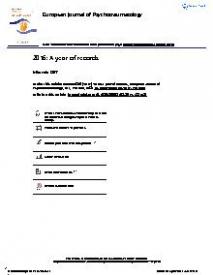2016 : a year of records
Happy New Year to our readers around the world – some of them it just started, for others it will soon begin – from the European Journal of Psychotraumatology, the European Society for Traumatic Stress Studies (ESTSS) and the team at Taylor and Francis. According to Johan Norberg (here), a popular Swedish author, historian and expert in economic globalization, our progress has been unprecedented.
On almost any index things are markedly better now than they have ever been. We are safer, healthier, there is more prosperity and less inequality. Yet, we have witnessed a dramatic increase in political, religious and ideological violence around the world. The year 2016 has not been an easy one for many individuals. Terrorist attacks have dominated the news and sadly, the first day of this year did not start well with another act of terrorism in Turkey. Fear is easily fostered. Although we are much more likely to be in a traffic accident than to find ourselves a victim of terrorism, our mind is not always rational about it. And the minds of those who have witnessed violence in the past are likely to be even more tuned in towards potential danger. A terrorist hidden in a stream of refugees easily feeds beliefs on the dangers of the stranger, making refugees and migrants easy topics dominating the elections all over Europe and in the US. Man-made or not, global warming has continued: 2016 was the third year in a row with record high global temperatures with floods, earthquakes and draughts affecting millions of people. This also leads to more global inequality and migration. The UNHCR reported that more people have been driven from their homes than at any time since records began, over 65 million displaced worldwide, with the shocking conclusion that ‘one in every 113 people on earth is either an asylum-seeker, internally displaced or a refugee’ (UNHCR, http://www.unhcr.org/ global-trends-2015.html). Relatively few asylum seekers find their way to Western Europe, by the way.
Countries like Turkey, Pakistan, Lebanon, and Iran host most of them (Turner, 2015). While refugees and migrants are trying to escape from war, draught, poverty, or violence, they represent one of the most vulnerable populations. However, they have the same aspirations as any human being – to be safe, healthy, and with a better future (for their children).
In: European journal of psychotraumatology, ISSN 2000-8066 | 8 | 1 | January | 1281533
http://dx.doi.org/10.1080/20008198.2017.1281533


